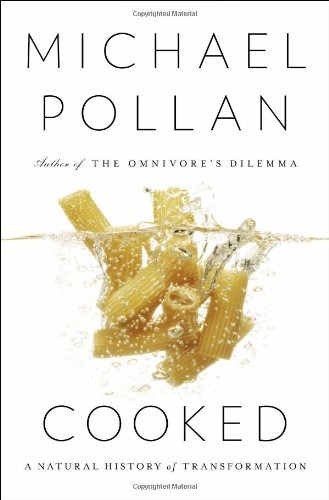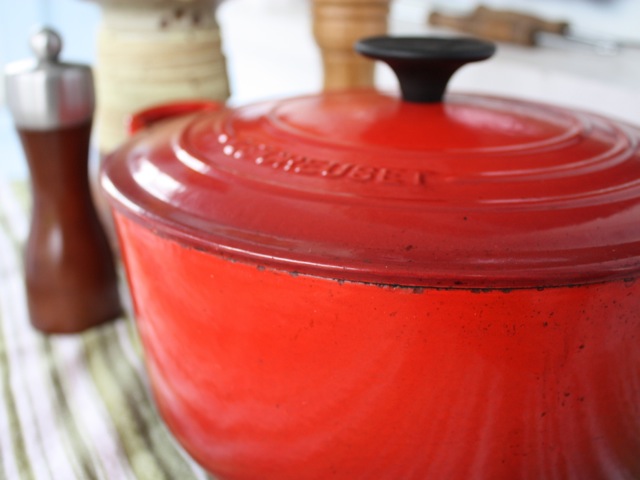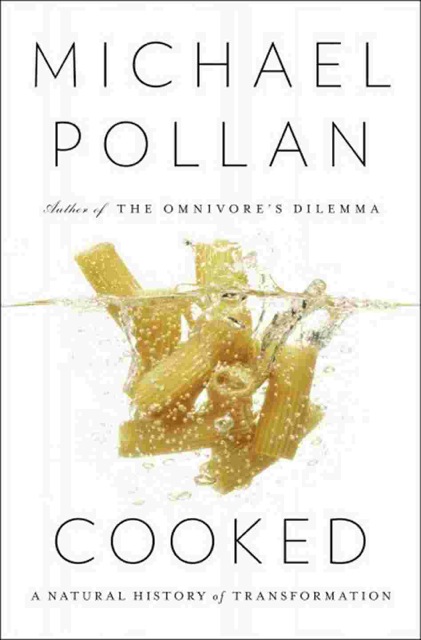
reference-image, l
(article, Laura McCandlish)
[%pageBreakSettings nobreak=true] Michael Pollan seems like an awfully busy guy. He's a journalism professor at the University of California, Berkeley, where he recently launched a food-and-farming journalism fellowship. (More than 250 writers applied for the initial five fellowships, including me.) He's on the road a good deal, lecturing about food politics and promoting his newest book, Cooked: A Natural History of Transformation. And yet his message is always about slowing down — of taking the time to enjoy gardening, or foraging for mushrooms, or tracking a wild boar, or slow-cooking a leg of said boar. [[block(sidebar). h1.Featured recipe]] Cooked is his most significant book since 2006, when The Omnivore’s Dilemma turned a man best known for his contemplative nature writing into our leading '"good, food advocate. As he did in The Botany of Desire and The Omnivore's Dilemma, Pollan again employs a four-part book structure to trace the history of how humans (with much help from our bacterial allies) have transformed raw meat, produce, and grains into more nutritious and delectable foods. The sections are titled "Fire" (think whole-hog Carolina barbecue), "Water" (long-simmered ragùs and other braises), "Air" (bread leavened with San Francisco sourdough starter) and "Earth" (fermented foods, including krauts, raw-milk cheese, and beer). Critical response to Cooked has been mixed. In the New York Times, Bee Wilson expressed bafflement at the book's presentation of Pollan as a novice cook: "He writes almost as if that other Michael Pollan — the one who taught us all so much about food — never existed." But Laura Miller, writing on Salon, was cheered by Pollan's exhortation to get behind the stove: "Maybe it’s not the most efficient use of our time, he concedes. But it’s good for the soul to be a producer some of the time, rather than just the consumers our corporate overlords want us to be." Most critics have praised Pollan’s concept and writing skills, while expressing unease with the gender politics involved in home cooking. In his review of Cooked for the Guardian, Jay Rayner noted that "Pollan recognizes that to argue for keeping cooking in the home . . . is to run up against gender politics. As he says, a man arguing for more domestic cookery is on dodgy ground, given that, whether we approve or not, that burden often falls upon women." The gender-politics issue isn't a new one for Pollan, who got spattered with plenty of frying fat in 2009, after publishing a magazine article in the New York Times claiming that feminism mistakenly forced women out of the kitchen and calling for Americans to start cooking more. Pollan's motivations are honorable: to empower everyone, regardless of gender, by handing them the tools to shop for, prepare, and enjoy wholesome foods. But he repeatedly bumps up against not just accusations of sexism but also of elitism — of ignoring the many obstacles keeping America's lower classes from acquiring good, clean, and fair food. Tom Philpott, reviewing Cooked for his Mother Jones blog, pointed out that Pollan's forays into cookery are entertaining but rarified: bq. By the time Cooked is cooked, Pollan has roasted a whole pig, been scolded by his private kitchen tutor, a Chez Panisse chef, that the dice on his mirepoix for his daube simply won't do (not fine enough), and produced a credible boule under the tutelage of the baking wizard who runs San Francisco's celebrated Tartine. Engrossing as they are to read about, none of these adventures are practical on a Tuesday evening after a long day at the office while the kids are screaming for dinner. And in the Seattle Weekly, Hanna Raskin chastised Pollan for viewing history through nostalgic glasses: "Pollan’s already taken flack for ignoring the many mothers who weren’t blessed with a kitchen or enough food to cook in it, but his argument’s equally nonsensical in a middle-class context. For much of American history, servants did the cooking." Philpott agreed, with a look back at his own response to Pollan's controversial 2009 article: "Pollan was right: people do need to revalue the craft of cooking, to embrace it as a quotidian pleasure, not a mere chore. But if we manage \[to\] convince them of that, we'll have achieved something new, not returned to a lost past." As I read Cooked, I found myself wondering about Pollan's own lost past. Like Bee Wilson, I was surprised to discover the author (at least for the purposes of his book) didn't consider himself much of a cook. Even if we don't pursue them every day, none of the techniques Pollan delves into in Cooked will be unfamiliar to Culinate readers; making our own bread, stock, or kimchi isn't necessarily daunting. Somehow that’s confidence-building: I’m more of a natural foodie in the kitchen than even Michael Pollan himself! [%image feature-image float=right width=400 caption="In his new book, Michael Pollan explores cooking techniques, including braising."] But then, we Culinate readers are already members of a select tribe: believers (often thanks to reading Pollan, natch) in the idea that cooking at home, preferably with local and organic ingredients, is the easiest and most direct way to subvert corporate control of our industrialized food system. The result, usually, is more delicious food that happens to be better both for our health and the environment. So whether or not any of us, Pollan included, were "real" cooks in the past, we're all now members of the Pollan choir. The real question is this: Will anyone outside the Church of Pollan bother to read his latest? Well, the non-culinary benefits of kitchen work might persuade the unconverted. Cooking, for Pollan, is less about consumption than about community; it’s a balm for our device-tethered, '"bowling modern lives. By way of example, Pollan details his new fall tradition: a pig roast, in which food is secondary to the camaraderie fostered by the event. And, Pollan declares, preparing food promotes mental health. In his section on braising, Pollan learns to greet the Sunday-afternoon drudgery of chopping onions with equanimity, though the Buddhist concept of mindfulness still eludes him. “After a week in front of the screen, the opportunity to work with my hands — with all my senses, in fact — is always a welcome change of pace, whether in the kitchen or in the garden,” Pollan reveals. “There’s something about such work that seems to alter the experience of time, helps me to reoccupy the present tense.” Amen. As for the gender-politics problem, I get the sense that, while Pollan tries to do the right thing, he still trips over his own unconscious assumptions. “I’ve come to think cooking is too important to be left to any one gender or member of the family; men and children both need to be in the kitchen, too, and not just for reasons of fairness or equity,” he writes in an eloquent introduction. Yet only one of his four sections (the "Water" one) stars a female chef: the charismatic Iranian-American Samin Nosrat, a former Chez Panisse prep cook who schools Pollan (her former food-writing prof) in “Grandma cooking.” Of all the cooking techniques Pollan spends three years exploring, it is Nosrat's humble braising (a simmering mirepoix cooked down with a browned, cheap cut of meat) that now remains woven into his weekly routine. Not the macho barbecuing, nor the mystical fermenting, but the simple technique of the braise. [%image bookcover float=left width=300] In the final "Earth" section, Pollan does learn raw-milk cheesemaking from a dynamic microbiologist-nun, Noella Marcellino, who makes a Connecticut version of the French fungal-ripened Saint-Nectaire cheese. But fermentation guru Sandor Katz leads the chapter. No mention is made of Linda Ziedrich, an author highly regarded in fermentation circles; her classic The Joy of Pickling, in fact, came out several years before Katz’s Wild Fermentation. (Like Ziedrich, Pollan opines that chard stems make the best pickles.) Pollan also travels all the way to Korea to learn how to make traditional kimchi by rubbing each intact Napa cabbage leaf with spice paste, but he doesn’t bother to mention his “most memorable” teacher, Hyeon Hee Lee, until the Afterword. She stresses the valuable Korean distinction between “tongue taste” (McDonald's) and “hand taste” (a complex, handmade food such as kimchi). Pollan deliberately apprentices with mostly male chefs to underscore the reality that barbecue pit masters are almost exclusively men (albeit often African-Americans toiling in the back of white-owned enterprises), “as are brewers and bakers (except for pastry chefs).” But why not highlight female bakers, such as Katie McNeil of Pacific Sourdough and Piper Davis of Grand Central Bakery? (Both women are based near Pollan in neighboring Oregon.) Such reportage might do more to shatter stereotypes than further promotion of Chad Robertson’s deservedly well-received [%amazonProductLink asin=0811870413 "Tartine Bread"] book. Look at what The Omnivore’s Dilemma did for the previously unknown polyculture farmer Joel Salatin. Still, Pollan’s writing is peerless in its ability to get us up from our desks and into the kitchen (or the garden, or the farmer's market) to change our food habits. Already, I’ve found myself compulsively consuming kimchi and raw-milk yogurt, to ensure I’m not just feeding myself but also my microbiome. (His final section on the wide-ranging health effects of the bacterial balance in our guts warrants its own book; indeed, the science writer Moises Velasquez-Manoff recently published An Epidemic of Absence: A New Way of Understanding Allergies and Autoimmune Diseases.) I bought some hops to plant, inspired by Pollan to finally try — if just once — brewing my own beer. He also demystified how to feed and maintain a sourdough starter. Despite his many accolades and controversies, I find that Pollan remains refreshingly humble and accessible. And that may be the best, hidden message of Cooked — that if he can do it, you can, too. p(bio). Laura McCandlish is a food writer and radio producer who recently relocated from Oregon back East to Maine. She’s currently reporting on Maine’s agricultural Somali refugee community, with support from a New America Media Women Immigrants fellowship.

reference-image, l

feature-image, l

featurette-image, l

promo-image, l

bookcover, l

newsletter-image, l